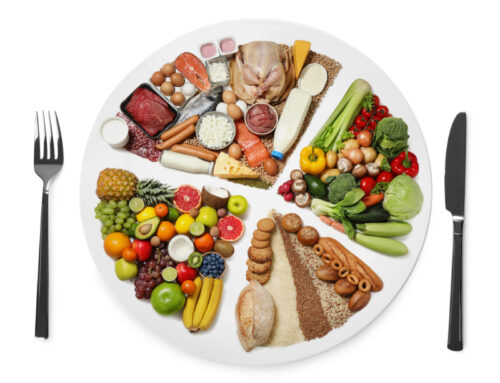By Dr. Angelina Riopel, ND
Weight loss is a big business. It is confusing and we have been sold the idea of quick fix, dramatic weight-loss that is often not healthy nor sustainable. Unfortunately this often leads to yo-yo dieting, dramatic weight-loss then the inevitable weight gain, and do it all over again. So what is a healthy diet? How does one achieve a healthy weight?
Michael Pollen, author of ‘The Omnivores Dilemma’, gives simple but sage advice on healthy eating: “Eat food. Not too much. Mostly plants”. Many who are over-weight and even those that are not, are often over-fed and under nourished, consuming highly refined foods that are high in calories, but void of nutrients. Increasing nutrients from a wide variety of foods and food groups and decreasing empty calories, allows your body’s nutritional requirements to be met and will often address food cravings. Cravings and excessive hunger is often a result of malnutrition and consumption of empty food.
Establishing a healthy and sustainable way of eating, which includes food choices and creating healthy habits, will naturally promote weight loss and allow the maintenance of a healthy weight. Individual considerations must be made for health concerns, such a poor digestion, chronic stress and hormone imbalances as these conditions will influence the breakdown and absorption of nutrients, as well as metabolism. A health professional such as a naturopathic doctor, can help address underlying health issues that may be contributing to weight gain or difficulties losing weight.
What to eat
Choose foods that are in their natural state, that are not refined and do not come in a box. For example, eat brown rice over brown rice pasta or whole oat porridge rather than boxed cereal.
Create balanced meals. The vegetable portion of a meal should include up to three different vegetables and should fill half of your plate. The protein source should fill quarter of your plate or the size of the palm of your hand, and a complex carbohydrate will be the remaining quarter of the plate. Include healthy fat, which may be olive oil, avocado or seeds.
Consume protein with every meal, whether animal or plant. Lean, quality protein helps you stay fuller for longer and curb sugar cravings.
Increase fiber intake. Fiber helps to keep blood sugar levels stable, assists in the elimination of toxins from the body and improves bowel habits. Important sources of fiber come from complex carbohydrates including beans, legumes, whole grains, seeds, fruit and vegetables.
Increase vegetable and fruit intake. Goal: 5-6 servings of vegetables per day and 2-3 servings of low glycemic fruit (berries, apples, pears). Eat a big salad or a bowel of steamed vegetables everyday!
Include healthy fats in your diet. Healthy fats include avocado, nuts, seeds, coconut oil, olive oil, wild fatty fish and pasture raised animal protein and butter.
Drink more water. Hydration can curb hunger and will help flush toxins from your system.
Herbal bitters taken before meals can help curb sweet cravings and improve digestion
Establish Healthy Habits
Stabilize blood sugar levels by eating 3 meals per day and healthy snacks in between. Do not skip breakfast. Include a quality protein source with your meals and snacks. Avoid simple carbohydrates, especially on their own. Balanced blood sugar allows your body to release fat, protect lean muscle and increase energy.
Plan your meals and travel with snacks. Being prepared is essential.
Eat more the majority of food earlier in the day, and enjoy a light dinner. Do not eat within 3 hours of bedtime. Have a protein snack if you are hungry in the evening.
Eat slowly and chew your food well. This will improve digestion as well as allow your brain to catch up with your stomach and prevent over-eating.
Eating off of a smaller plate. This will influence the perception of the amount of food you are eating. You will feel more satisfied eating from a full smaller plate, than from a not full larger plate.
80/20 Healthy food vs Fun food. Eating healthy 80% of the time allows for “fun food” 20% of the time. Keep the message positive, fun food or treat, rather than cheat.
Move daily. Find a form a fitness that you enjoy. Walking, dancing, weight training or sports will help to improve metabolism, help you lose weight and also has the added benefit of improving mood.





